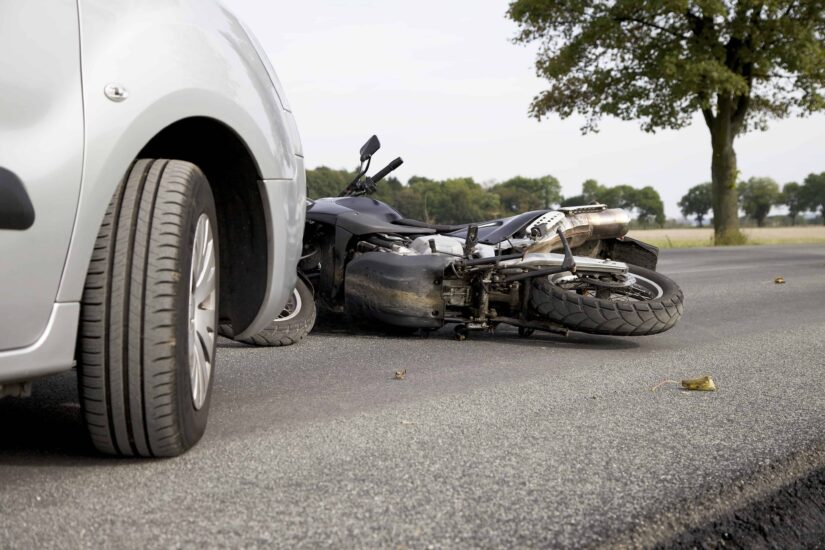Is Lane Splitting Legal in Florida?
May 24, 2024

At Lewis & Castagliola, P.A., we are a team of car accident and drunk driving lawyers who are deeply invested in the safety and legal clarity for all road users, especially motorcyclists. If you’re asking yourself the question, “Is lane splitting legal in Florida?” continue reading this blog post. We’ll discuss lane splitting, explore the legal consequences and provide comprehensive insights into its safety and implications to help you avoid a lane splitting accident. And, if you’ve been involved in a lane splitting motorcycle accident, we’ll explain why it’s crucial to hire an experienced motorcycle accident lawyer.
Understanding Florida Lane Splitting and Motorcycle Accidents
Understanding Florida lane splitting is crucial for both motorcycle riders and drivers alike. Lane splitting, or white-lining, is when motorcycle riders move between rows of stopped or slow-moving traffic that is proceeding in the same direction. Lane splitting is commonly observed in heavy traffic situations, when a lane splitting motorcyclist takes advantage of their vehicle’s smaller size to maneuver through tight spaces. Lane splitting is considered a noncriminal traffic infraction. This offense does come with the possibility of a monetary fine, however, which will vary depending on the motorcyclist’s driving history.
Lane splitting can be seen as a way to save time and bypass slowed traffic, potentially reducing surrounding traffic congestion overall. However, it’s not without its risks, and it’s always possible that a lane splitting accident can occur if you engage in this practice. The close proximity to other vehicles, the reduced space to maneuver, and the potential for sudden movements by unaware drivers can make lane splitting dangerous for motorcycle riders. This is why lane splitting is surrounded by legal restrictions and safety debates.
Is Lane Splitting Legal in Florida?
In regions where lane splitting is illegal, such as Florida, motorcyclists who engage in this practice may be subject to traffic citations. Even in places where it is permitted, there are often specific guidelines that must be followed to ensure the safety of all road users. For instance, there may be limits on the speeds at which a motorcyclist can engage in lane splitting, or restrictions based on the type of road or area.
Understanding these laws and the potential hazards is essential for motorcyclists to make informed decisions. It also helps car drivers anticipate the possible presence of motorcyclists and respond appropriately, fostering a safer environment for everyone. Despite its potential benefits in reducing traffic congestion, lane splitting remains a contentious issue due to the complex balance between efficiency and safety.
Current Legal Status of Lane Splitting in Florida
In Florida, the practice of lane splitting remains clearly outside the boundaries of the law. The state’s legislation mandates that all motor vehicles, including motorcycles, must be operated within a single lane and adhere to the established guidelines for changing lanes safely. This legal framework is designed to ensure the safety of all road users by minimizing unpredictable movements that could lead to accidents.
For motorcyclists, specifically, this means that any attempt to navigate between lanes of traffic, or to overtake other vehicles within the same lane, is considered illegal. Such actions are viewed as hazardous not only to the motorcyclist but also to other drivers who may not anticipate a vehicle advancing from an adjacent lane. Consequently, engaging in lane splitting can lead to being stopped by law enforcement and issued traffic citations, which can carry fines and points on a rider’s license.
It’s important to note that while lane splitting is illegal in Florida, other states may have different regulations regarding this practice. However, within the Sunshine State, adherence to the prohibition of lane splitting is strictly enforced to maintain traffic order and prevent accidents. Motorcyclists are encouraged to respect these laws for their safety and the safety of others on the road. Ignoring these rules can result in legal repercussions that extend beyond immediate fines, potentially affecting insurance rates and legal standing in the event of an accident.
Is Lane Splitting Safe? Arguments for and Against Lane Splitting
Arguments for and against lane splitting are a source of ongoing debate among motorcyclists, lawmakers, and road safety experts. Those who advocate for the legalization of lane splitting often cite studies from regions where the practice is permitted, arguing it can lead to smoother traffic flow among slow moving cars and reduced congestion. They argue that motorcyclists can more easily navigate through traffic, which in turn can decrease commute times for all road users. Moreover, proponents point out that lane splitting may lower the risk of rear-end collisions for motorcyclists, as they are less likely to be stationary targets in congested traffic.
Safety Concerns When It Comes to Lane Splitting
On the other hand, opponents of lane splitting believe it can cause serious accidents. They argue that the close proximity required for lane splitting increases the risk of lane splitting accidents. Drivers in cars and trucks may not expect a motorcyclist to pass through narrow gaps, especially if they are not actively checking their mirrors or blind spots. This lack of anticipation can result in sudden lane changes or movements that endanger the safety of motorcyclists. Additionally, opponents suggest that lane splitting can be particularly dangerous in areas with larger vehicles, such as SUVs and trucks, which have wider blind spots and can make it more difficult for drivers to detect motorcyclists.
Furthermore, critics of lane splitting express concerns about the varying skill levels of riders and the potential for high-speed differential. They worry that less experienced motorcyclists may attempt to lane split without the necessary skills to do so safely, or that some riders may abuse the practice by speeding excessively between lanes, further increasing the risk of accidents.
Safety Considerations for Motorcyclists
Safety considerations for motorcyclists extend well beyond the basics of helmet use and obeying traffic laws. As riders, we are exposed to greater risks on the road due to the open nature of motorcycles. This vulnerability makes it all the more critical to prioritize safety at all times. In addition to adhering to traffic laws, such as those prohibiting lane splitting in Florida, motorcyclists must take proactive steps to protect themselves.
Wearing appropriate gear is just the start. This includes not only a DOT-approved helmet but also protective clothing such as jackets, pants, gloves, and boots designed to safeguard against abrasions and impacts. High-visibility attire or reflective materials can be lifesaving, as they significantly increase a motorcyclist’s visibility to other drivers, particularly in low-light conditions or inclement weather.
Maintaining a safe speed is another key aspect of motorcycle safety. Speeding reduces reaction time and increases the severity of an accident should one occur. It’s important to ride at speeds appropriate for the road conditions and one’s skill level. Additionally, motorcyclists should practice defensive riding techniques, always staying alert and anticipating the actions of other drivers. This includes maintaining a safe following distance, being cautious at intersections, and being prepared to take evasive action if necessary.
Ensuring that your motorcycle is in good working condition is also essential. Regular maintenance checks, including brakes, tires, lights, and signals, are crucial for safe operation. A well-maintained bike is more responsive and reliable, which can make all the difference in avoiding an accident.
Effectiveness of Lane Splitting in Reducing Congestion
While lane splitting leads to reduced congestion in specific circumstances, it’s not legal in Florida. Studies in areas where lane splitting is permitted have shown that it can alleviate traffic backups, but these benefits must be weighed against potential safety risks and the current legal framework of the state.

How Lane Splitting Impacts Motorcycle Accident Claims
If a motorcyclist is involved in an accident while lane splitting in Florida, it can significantly impact their ability to claim damages. Since the practice is illegal, it may be considered negligent behavior, which can reduce or eliminate fair compensation in a personal injury claim against the other driver. It’s crucial for the motorcyclist involved to understand how their actions can affect their legal rights in the event of an accident.
Steps to Take if You’ve Been Caught Lane Splitting
If you’re involved in an accident while lane splitting, it’s important to stay calm and seek medical attention if needed. Contact law enforcement to report the accident and obtain a copy of the police report. Document the scene and gather contact information from witnesses. Then, consult with a knowledgeable motorcycle accident attorney to understand your legal options and protect your rights.
Other Motorcycle Laws and Regulations in Florida
A Florida motorcycle rider must adhere to all state traffic laws, including wearing a helmet if under 21 or otherwise having an insurance policy with at least $10,000 in medical benefits. Eye protection is mandatory for all riders, and motorcycles must be equipped with certain safety features, such as mirrors and proper lighting. Understanding and complying with these laws is essential for every rider’s safety and legal protection.
Contact Us for a Free Consultation if You’ve Been Involved in a Florida Lane Splitting Incident
While lane splitting may offer certain advantages, it remains illegal in Florida, and the risks involved—both legal and physical—cannot be overstated. As motorcyclists, we must prioritize safety and legality in our riding habits. Should you find yourself facing legal challenges related to motorcycle riding, including those stemming from lane splitting, contact us for a free consultation. Ride safely, and always stay informed about the laws that affect you on the road.
